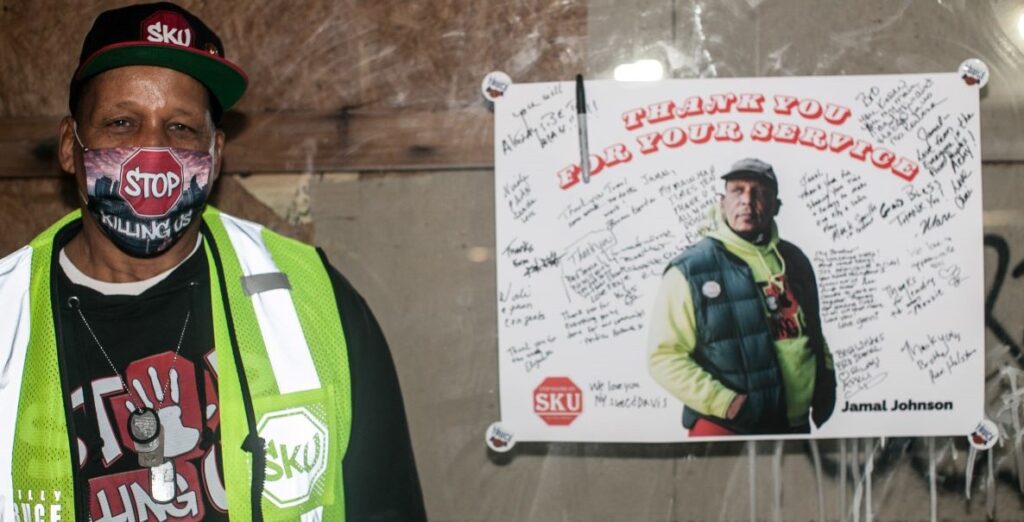Jamal Johnson has spent years boots on the ground in the neighborhood in North Philly, South Philly, all over Philly, to marching to Washington, D.C., and showing up in Houston, TX, Harrisburg, Standing Rock, and New York City, working as a nonpolitical activist against gun violence. He came to South Street the night before the November 7 election to recognize the last night of “Hug the Block, and say he needed a break.
Johnson founded Stop Killing Us March in 2017 after a Philadelphia police officer shot 30-year-old David Jones in the back during a traffic stop. The year before that, one of Johnson’s granddaughters got shot in the leg.
So, Johnson walked to Washington, D.C. to protest gun violence, especially police violence. And he kept on marching. He’s a former Marine, retired postal worker and great-grandfather. Johnson began protesting at City Hall, going on hunger strikes, showing up at scenes of homicides, and traveling across the country to help where felt most needed.
Hug the Block
This summer — August 22 to November 6 — he felt most needed on the streets of Philadelphia. Every night, Johnson joined the founders of the Philly Truce App from 10pm to 4am to walk one of 77 blocks where, since 2015, more than 10 people lost their lives to gun violence 2015. They called what they were doing “Hug the Block.”
When people say “hug the block” where I’m coming from, that means selling drugs. I love how they changed the meaning of it. We need more hugs and less violence.
On the last night, they came to 3rd and South streets to meet up with people from the cause. There was Lorenzo’s pizza, and baked goods from a South Street bakery. Some of the guys there in their late 50s and early 60s I knew from back in the day. They had been incarcerated and also had been working to change the paradigm of what’s going on. I saw Wali Smith from Universal Companies. I used to march with these guys. Sometimes Tumar Alexander from the City would be there. We would march and shout, “Put it down. Put the guns down.”
And Wali would say to me, “Rube, you the cool one! You avoided the thing.” I was the one that didn’t go to prison, that made my way as my own kind of entrepreneur.
Young people were there too. Students from Temple and Drexel stepped onstage and said they’d take the torch from Johnson. And Johnson spoke. He’s said he’s not into politics, because “People play politics with children’s lives.” He said there are too many nonprofits where people are making profits.
He also said he was tired. He had dedicated too much. But I think once he rests up, he’ll be back.
Johnson takes the bullhorn for what he says is the last time.
West Philly born and raised with a slosh of Brooklyn New York in between, Big Rube partnered with Mitchell & Ness in 2000 to help make it a global brand marketing and selling high-end vintage jerseys. He has been photographing Philly since 2009, including in a Daily News Column from 2011 to 2017. He’s also a chef, operating Chef Big Rube’s Kitchen seven days a week at Pitcher’s Pub in Manayunk, selling the best handmade food in a Main Street dive bar.

